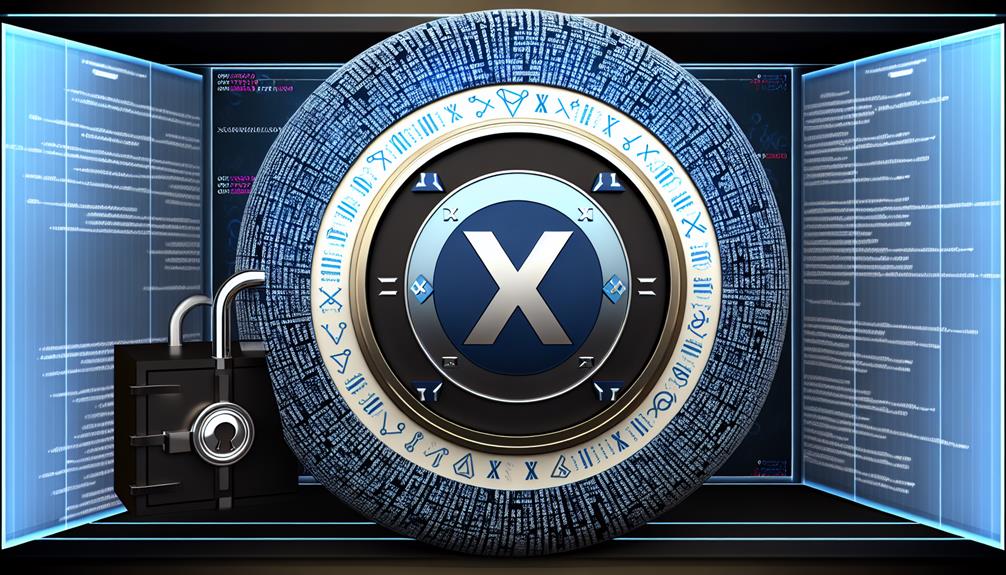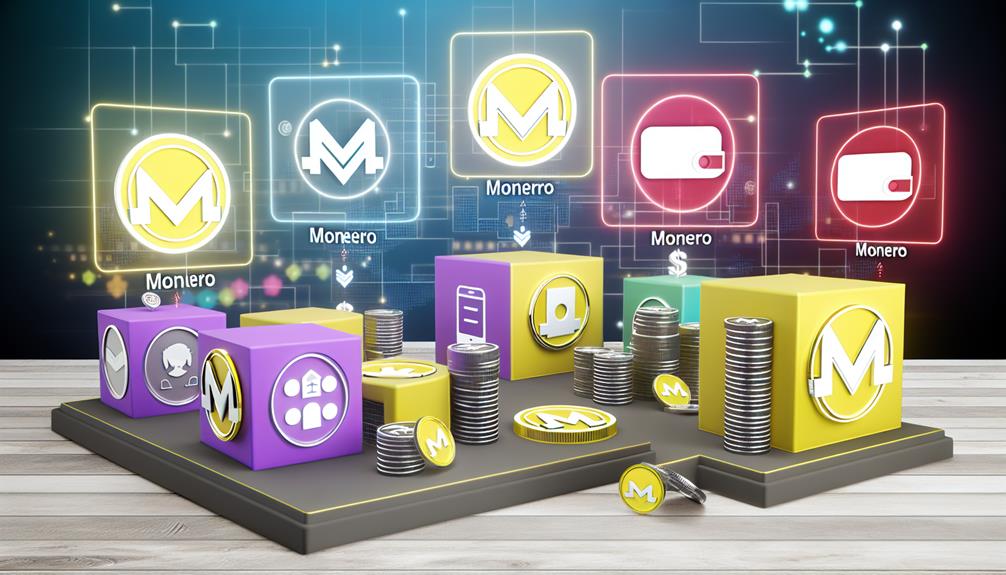You might not realize that Monero's unique privacy features set it apart from many other cryptocurrencies. If you're considering acquiring XMR, it's essential to understand the various avenues available to you, from exchanges to mining. Each method comes with its own set of advantages and challenges, especially regarding security and anonymity. You'll want to explore which option aligns best with your needs and risk tolerance, but that's just the beginning of what you need to know about getting started.
Understanding Monero Basics

Monero, often referred to as XMR, stands out among cryptocurrencies due to its focus on privacy and anonymity. Unlike Bitcoin, which uses a transparent ledger, Monero employs advanced cryptographic techniques to obfuscate transaction details. This guarantees that your financial activities remain confidential, a vital feature for users prioritizing Monero privacy. The use of ring signatures, stealth addresses, and confidential transactions allows Monero to mask sender and receiver identities, along with the transaction amount, creating a secure environment for digital transactions.
However, achieving this level of privacy presents challenges, particularly concerning Monero scalability. As the network grows and more users transact, the demand for processing power and storage increases. Monero's blockchain size can expand rapidly, leading to potential slowdowns in transaction speeds and higher fees. Developers are actively working on solutions to enhance scalability without compromising privacy. For instance, techniques like bulletproofs have been introduced to reduce transaction size and improve confirmation times, thereby addressing scalability concerns while maintaining the core focus on anonymity.
As you explore Monero, it's important to understand that its privacy features are not just a unique selling point but a fundamental principle. This commitment to anonymity alongside ongoing enhancements in scalability makes Monero a compelling option for users looking for secure and private transactions in the cryptocurrency space. Ultimately, comprehending these basics sets the stage for a more informed engagement with Monero and its ecosystem.
Choosing a Wallet
When choosing a Monero wallet, it's essential to understand the various types available, including hardware, software, and paper wallets. You'll also want to assess the security features each option offers, as this directly impacts the safety of your funds. Finally, setting up your wallet correctly guarantees a smooth experience in managing your Monero assets.
Types of Monero Wallets
Choosing the right wallet for Monero is essential to ensuring the security and accessibility of your funds. There are several types of wallets to evaluate, each with its own advantages and drawbacks.
Paper wallets offer a secure cold storage option, allowing you to store your private keys offline. Mobile wallets provide convenient access on-the-go but are regarded as hot wallets, which may expose you to higher risks. Web wallets, while accessible from any device with an internet connection, fall under custodial wallets, meaning you're trusting a third party with your keys.
Desktop wallets provide a balance between security and usability, as they allow you to retain control of your keys while offering a user-friendly interface. For those seeking enhanced security, multi signature wallets require multiple private keys to authorize transactions, adding an extra layer of protection.
Ultimately, your choice should depend on your particular needs—whether you prioritize convenience, security, or control over your assets. Evaluating the types of wallets available will help you make an informed decision that aligns with your Monero investment strategy.
Security Features to Consider
A thorough evaluation of security features is essential when selecting a wallet for Monero. You'll want to prioritize transaction privacy, as this is one of Monero's core advantages over other cryptocurrencies. Confirm the wallet you choose supports Monero's unique privacy features, such as stealth addresses and ring signatures, which obscure transaction details.
Next, consider the wallet's use of advanced encryption. A wallet that employs strong encryption methods helps protect your private keys from unauthorized access. Look for wallets that implement end-to-end encryption for data storage and transmission, confirming your information remains secure.
Additionally, evaluate the wallet's backup and recovery options. A secure wallet should allow you to create encrypted backups, safeguarding your assets against loss. Two-factor authentication (2FA) can also enhance security, adding an extra layer of protection when accessing your wallet.
Lastly, consider the wallet's reputation and reviews within the Monero community. Wallets that have undergone audits or have established a track record of security are generally more trustworthy. By focusing on these security features, you can make an informed decision that prioritizes the safety of your Monero holdings.
Setting Up Your Wallet
Establishing a secure and efficient wallet for Monero is crucial for managing your cryptocurrency effectively. There are several types of wallets to evaluate, including hardware, software, and web wallets. Hardware wallets provide high security by storing your private keys offline, while software wallets offer convenience for everyday transactions. Make certain to assess your needs before choosing a wallet.
When selecting a wallet, pay attention to wallet recovery options. A robust recovery mechanism guarantees you can regain access to your funds in case of device loss or failure. Look for wallets that offer mnemonic phrases or seed phrases, as these are essential for wallet recovery.
Additionally, evaluate wallet integration with other services. Some wallets provide seamless connections to exchanges, making it easier to manage your Monero assets in one place. Assess the wallet's compatibility with various platforms and applications to enhance your overall user experience.
Buying Monero on Exchanges

Often regarded as one of the more accessible methods for acquiring Monero, buying it on exchanges offers a straightforward approach for both beginners and seasoned investors. When you decide to purchase Monero, you'll likely encounter various exchanges that facilitate these transactions. Each platform has its own set of advantages and limitations, which can impact your overall buying experience.
One of the significant advantages of buying Monero on exchanges is the ability to leverage the liquidity these platforms provide. This liquidity enables quick transactions, allowing you to respond rapidly to market changes. However, it's important to take into account Monero limitations, such as potential regulatory scrutiny. Some exchanges may impose restrictions due to Monero's privacy features, which can affect your ability to buy or withdraw funds.
Monero's privacy-centric design attracts a dedicated community and fosters increased adoption, but it can also lead to challenges regarding compliance with local laws. As regulations around cryptocurrencies evolve, staying informed on how they may affect your transactions is vital for your investment strategy.
Looking ahead, the future of Monero appears promising, driven by its robust technology and supportive community. Nevertheless, you should remain aware of potential forks that may arise, which could impact the coin's ecosystem. In conclusion, while buying Monero on exchanges is a viable option, it's important to carefully weigh the associated risks and benefits, especially concerning privacy and regulatory dynamics.
Mining Monero
When mining Monero, understanding the hardware requirements is essential for optimizing your operation's efficiency. You'll also need to evaluate various mining software options that best suit your setup, as well as consider whether to mine solo or join a pool. Each choice considerably impacts your potential rewards and overall experience in the Monero ecosystem.
Hardware Requirements Overview
To successfully mine Monero, you'll need to evaluate several key hardware requirements that directly influence your mining efficiency and profitability. Understanding these hardware specifications is critical for enhancing your setup and ensuring system compatibility.
- CPU Power: Monero mining primarily relies on CPU performance. A multi-core processor with high clock speeds will enhance your hashing capabilities. Look for CPUs with at least 8 cores for best results.
- RAM: Adequate RAM is necessary for effective mining operations. Aim for a minimum of 8GB, as this will support the necessary processes without bottlenecking your system.
- Cooling Systems: Mining generates significant heat, so investing in a reliable cooling solution is essential. Effective cooling systems, whether air or liquid, will help maintain ideal operating temperatures and prolong your hardware's lifespan.
Mining Software Options
Selecting the right mining software is vital for maximizing your Monero mining efforts, as it directly impacts your hashing efficiency and overall profitability. You'll find various options available, but it's important to perform mining software comparisons to identify the best fit for your hardware and preferences.
Popular choices include XMRig, which is known for its flexibility and performance. It offers customizable settings that can help you achieve ideal mining settings tailored to your specific configuration. Another option is XMR-Stak, which provides support for both CPU and GPU mining, making it a versatile choice for different setups.
When evaluating mining software, consider factors such as user interface, ease of setup, and community support. Look for software that allows you to adjust parameters like thread count and CPU affinity, as fine-tuning these settings can greatly enhance your mining efficiency. Additionally, make sure that the software you choose is regularly updated to integrate the latest improvements and security features.
Ultimately, choosing the right mining software will streamline your Monero mining operation, helping you achieve better results and maximize your returns.
Pool Vs. Solo Mining
Deciding between pool and solo mining for Monero can greatly impact your mining success and reward distribution. Each method has its unique advantages and drawbacks, and understanding them can guide your mining strategies.
Here are three key considerations:
- Pool Advantages: Joining a mining pool can provide a steady stream of rewards, as your combined hash rate increases the likelihood of solving blocks. This approach mitigates the volatility of reward distribution, offering more predictable earnings.
- Solo Benefits: If you prefer complete control over your mining efforts, solo mining allows you to keep all the rewards. However, it requires a significant hash rate to contend with the network difficulty, making it less viable for many miners.
- Mining Risks: Both strategies come with risks. Pools may face centralized mining concerns, while solo miners deal with long periods without payouts. A profitability analysis factoring in your resources and community support can help you make an informed decision.
Ultimately, the choice between pool and solo mining hinges on your resource management capabilities and your willingness to navigate scalability challenges within the Monero network.
Peer-to-Peer Transactions

Engaging in peer-to-peer transactions is one of the most effective ways to acquire Monero, as it allows you to trade directly with other individuals without the need for intermediaries. This method leverages peer networking, enabling you to connect with buyers or sellers who are also participants in the Monero ecosystem. The decentralized nature of these transactions not only facilitates quicker exchanges but also enhances the transaction anonymity that Monero is renowned for.
When you opt for peer-to-peer transactions, you're entering a space where you can negotiate terms directly with the other party, which can lead to more favorable conditions for both sides. You'll find various platforms and forums dedicated to facilitating these exchanges, allowing you to maintain a level of discretion that traditional exchanges often lack. By engaging in these transactions, you contribute to the overall robustness of the Monero network, as each trade strengthens its decentralized framework.
It's important to remember that while peer-to-peer transactions offer greater anonymity, you should still be cautious about whom you're dealing with. Ascertain that you use trusted platforms and communities, as this can help mitigate risks associated with fraud or scams. Ultimately, by utilizing peer-to-peer transactions, you not only acquire Monero effectively but also embrace the core principles of decentralization and privacy that underpin the cryptocurrency.
Security Considerations
When acquiring Monero, it's crucial to take into account various security aspects to protect your assets and personal information. The unique features of Monero, including its focus on transaction anonymity and privacy measures, require you to engage in proactive data protection strategies.
Here are three key security considerations to keep in mind:
- Wallet Encryption: Always use wallet encryption to secure your Monero wallet. This adds an additional layer of protection against unauthorized access, guaranteeing that even if someone gains access to your device, they cannot easily access your funds.
- Secure Backups: Regularly create secure backups of your wallet. This is critical for recovering your assets in case of device failure or loss. Confirm that these backups are stored in a secure location, separate from your primary device, to minimize risks associated with physical theft.
- Threat Assessment: Stay aware of potential phishing risks and other cyber threats. Be cautious about where you share your wallet information and never click on suspicious links. Utilizing reputable exchanges and services can considerably mitigate these risks.
Additionally, maintaining robust network security, such as using a VPN, can further enhance your privacy and transaction anonymity. By prioritizing these security measures, you'll not only protect your Monero holdings but also contribute to the overall integrity of the Monero network. Remember, a proactive stance on security is your first line of defense against potential threats in the cryptocurrency space.
Frequently Asked Questions
Is Monero Legal in My Country?
To determine if Monero's legal status applies to you, research your country's specific Monero regulations. Countries vary widely in their approach, so staying informed guarantees compliance and mitigates potential legal risks regarding cryptocurrency transactions.
Can I Use Monero for Online Shopping?
Imagine buying a rare collectible on an online platform that accepts Monero. You'll appreciate its privacy features, keeping your purchase discreet. While not universally accepted, some shopping platforms embrace Monero for secure transactions, ensuring confidentiality.
What Are the Tax Implications of Using Monero?
When using Monero, you've got tax reporting obligations, just like any other asset. However, its privacy features can raise concerns, complicating your ability to accurately report transactions and potentially attracting scrutiny from tax authorities.
How Do I Convert Monero to Other Cryptocurrencies?
To convert Monero, you'll need to find a reliable exchange that supports it. Transfer your Monero from your wallet, select the desired cryptocurrency, and complete the transaction—ensuring you're aware of any fees involved.
What Are Common Misconceptions About Monero?
You might think Monero's privacy features guarantee complete anonymity, but misconceptions linger. Its mining process varies, wallet options differ in security risks, and user demographics influence perceptions about transaction anonymity and overall reliability in cryptocurrency markets.
Conclusion
In conclusion, acquiring Monero isn't just about making a purchase; it's a journey into the depths of privacy and security. Whether you opt for exchanges, mining, or peer-to-peer transactions, each method has its nuances and risks. Remember, a secure wallet is your fortress, safeguarding your investments against potential threats. As you navigate this landscape, stay informed and vigilant—after all, in the world of cryptocurrencies, knowledge is not just power; it's your best defense.
